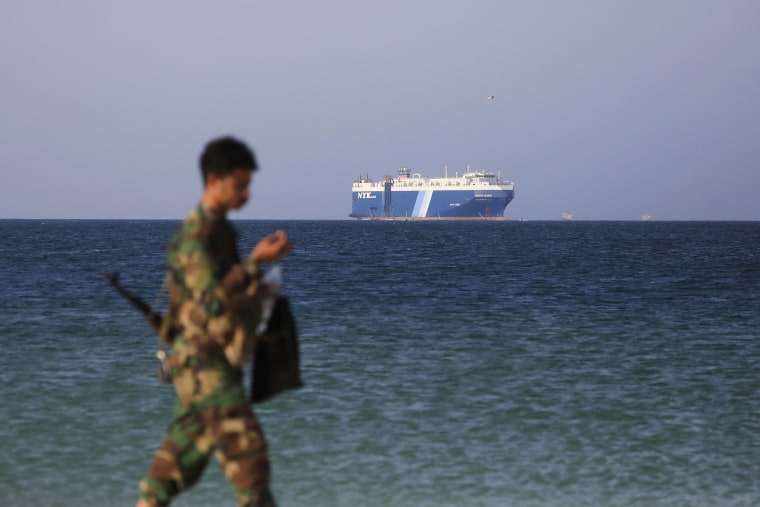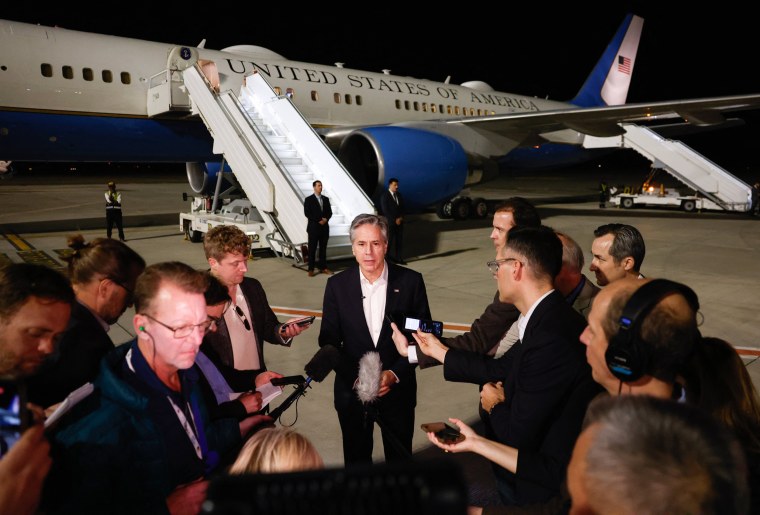Who are Yemen’s Houthis launching attacks in the Red Sea?
DOHA, Qatar — Battle-hardened and backed by Iran, Yemen’s Houthi rebels have launched a series of attacks on Israel as well as commercial ships in the Red Sea, stoking fears of a wider conflict in the region already reeling from the war in Gaza and on tenterhooks about escalating violence between Israel and Hezbollah fighters in Lebanon.
After declaring support last year for Hamas in its fight against Israel, they have bombarded ships in the Red Sea. They fired 21 drones and missiles Tuesday, their biggest attack yet according to British officials, ignoring a United Nations resolution and ultimatums by the U.S. and its Western allies to stop.
Overnight into Friday morning local time (Thursday evening ET), U.S. and British ships struck targets in Houthi-controlled parts of Yemen with fighter jets and Tomahawk missiles, two U.S. officials said.
The military action against the Houthis’ capability inside Yemen is a major escalation by the U.S., supported by the U.K., after Secretary of State Antony Blinken warned Wednesday that further attacks could prompt a Western military response.
The overnight strikes came after two administration officials told NBC News last week that members of President Joe Biden’s national security team convened a White House meeting to review possible options, including strikes against Houthi targets in Yemen.
The U.S. has previously struck Houthi vessels in waters near Yemen. Blinken, during a visit to Saudi Arabia on Tuesday, warned that the Houthis would face “consequences” if the attacks continued. But, he added, the U.S.’ “strong preference is that the Houthis get the message,” rather than face military action.
But who are the Houthi militants and how does the group fit into the wider conflict?
‘Partisans of God’
A large clan originating from Yemen’s northwestern Saada province, the Houthis are an extremist movement that follows Zaydism, a branch of Shiite Islam. Yemen was ruled by A Zaydi imamate for 1,000 years, until it was overthrown in 1962. Stripped of their political power since then, the Zaydis struggled to restore their influence in the country.
Formally known as Ansar Allah — or “Partisans of God” — their name comes from Hussein Badr al-Din al-Houthi, their former leader. He led an uprising in 2004 aimed at winning greater autonomy for Yemen’s provinces and protecting them from the perceived encroachment of Sunni Islam, according to the Wilson Center, a Washington-based think tank.

After the Arab Spring protests erupted in several countries in 2011, the group took control of the province of Saada. Three years later, its fighters swept into the capital, Sanaa, and forced President Abed Rabbo Mansour Hadi’s government into exile.
Neighboring Saudi Arabia, unwilling to accept the prospect of Yemen being controlled by a militant organization backed by its regional rival, Iran, responded by starting a war against the group.
But despite support from the U.S., Britain and several other nations, who armed the Saudis with fighter jets and bombs, and provided them with military expertise, the conflict lasted far longer than expected and proved costly for Riyadh.
The war also resulted in what the United Nations calls “the largest humanitarian crisis in the world” — with 80% of Yemen’s 32 million population in need of aid.
With little hope of victory, Saudi Crown Prince Mohammed bin Salman scaled back his military operation and entered peace talks with the Houthis last year.
Why is this region so important?
Yemen may be the poorest country in the region, but it forms the eastern side of the Bab al-Mandeb strait — or “the Gate of Grief” — a 16-mile stretch of water that marks the entrance to the Red Sea, one of the most important shipping lanes in the world.
Blinken said Sunday that the Houthis’ attacks had “disrupted or diverted more than 20% of global shipping.” CNBC reported last week that this amounted to some $200 billion in international trade.
Houthi spokesperson Mohammed al-Bukhaiti said Monday that the group was only targeting “ships linked to Israel, and we do not target any ship belonging to other countries,” a claim that has been widely disputed.

He added that the goal was not to sink or seize those ships, but put pressure on Israel to stop its war in Gaza and allow food and medicine into the enclave.
But according to Hakim Almasmari, a veteran political mediator in Yemen, the group wants revenge against the U.S….
Read More: Who are Yemen’s Houthis launching attacks in the Red Sea?

